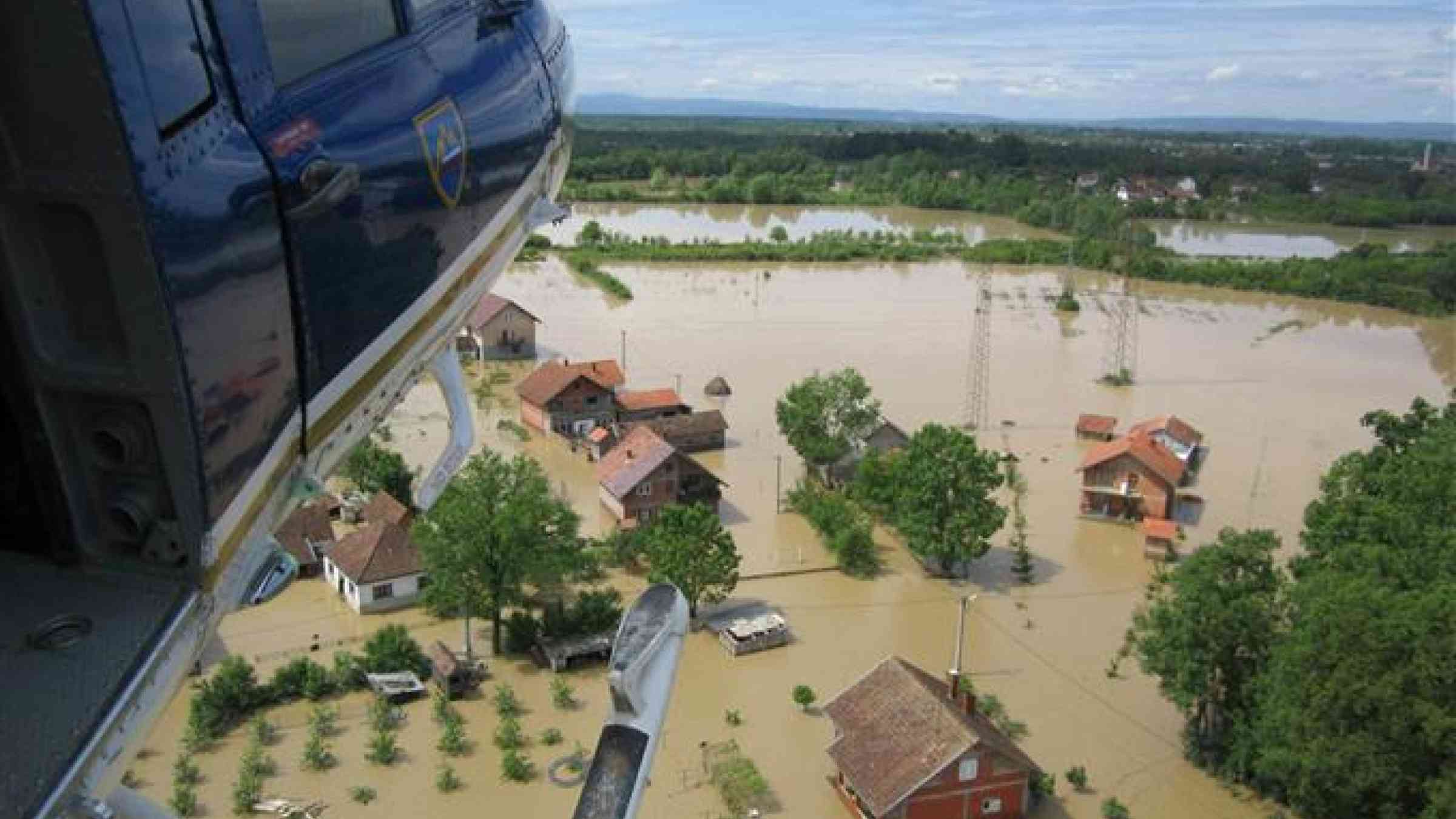An ecosystem-based approach to flooding in Bosnia’ and Herzegovina's Vrbas River Basin

Story by Andrea Egan, Raduska Cupac, Sladjana Bundalo
In Bosnia and Herzegovina (BiH) deforestation was significant and widespread during the war years, and created conditions conducive to further deforestation today.
“A lot of people left their properties because of the war and never moved back. Other people now use those private forests illegally since the original landowners are not there.”
Between 1990 and 2010, Bosnia and Herzegovina (BiH) lost 1.1% of its forest cover, or around 25,000 ha.
For flooding, deforestation can exponentially increase the damage and severity because the faster water runs from the watershed into the river, the higher a flood will be.
Deforestation Increases Flooding Risks
Trees prevent sediment runoff and forests hold and use more water than farms or grasslands. Without tree roots to absorb water from the soil, or hold the soil in place, sediment can quickly shrink river channels downstream.
Compounding how problematic the loss of trees can be, after a fire the forestry service will clean the debris and clear the whole area to plant new seedlings, but the process can take up to a year. And another decade needed for the forest to grow up. In the time it takes for the forest to regenerate, if there is a flood, the damage can be huge.
A Mighty River
In the Vrbas River Basin, the cumulative effects of deforestation, through illegal logging and fires, prepared the ground for extensive flooding in 2014. A small river, a tributary of the Vrbas river - usually called the diminutive “Vrbanja”, weaves through the town of Čelinac in north-west Republika Srpska. For the local population, of almost 17,000 people, during the 2014 flooding the river became dangerously high and brown. A local man remembers the road was flooded in many areas. “It awakens your deepest fears.”
“After the war we thought nothing so bad could happen to us, but yes, it could.” – Sladjana Bundalo, Project Officer, UNDP BiH.
Comprehensive Approach
Approaching flooding from a holistic perspective, the project “Technology transfer for climate resilient flood management in Vrbas River Basin” is supporting the government of BiH and communities of the Vrbas basin to enhance communication lines for flooding, reduce response times for forest fires, improve monitoring and forecasting of extreme weather events, and raise awareness of forest maintenance, including fire management and agro-forestry measures.
Funded by the Global Environment Facility‘s Special Climate Change Fund (SCCF) – a fund that was established to support adaptation and technology transfer in all developing country parties to the UNFCCC, the project is supporting communities to adapt to flood risk through the transfer of adaptation technologies for climate resilient flood management, and to embark on climate resilient economic activities.
Communication is Key
In the 2014 flooding, the village of Čelinac was cut off from the rest of the world including the main communication road. Electricity, phones, internet, and radio were all offline.
As part of project activities, efforts to improve communication for the purpose of Flood Forecasting and Early Warning System (FFEWS) are being approached from the institutional side (establishing responsibilities) and also from the technical side (with the purchase of necessary communications equipment).
This equipment, working to improve monitoring and forecasting of extreme weather events, will also enhance communication and reduce response times for forest fires.
One of the key links in the communication chain is the Civil Protection Unit (from local to entity level), since they are responsible for ensuring risk information and preparedness, monitoring and dissemination for any other disaster (e.g. fire). The improved communication tools will dramatically increase their effectiveness.
Inspiring Confidence, Inspiring Action
“We have to have an integrated approach with the basin. …Nobody expected a flood this big, but that is no excuse. It is impossible to totally protect people from the Vrbanja river. We accept our responsibility, but it was catastrophic. We can lower the negative effects.” Vitomir Kuzmanovic, Head of Department for Economy and Public Service, Čelinac Municipality.
Working closely with state, entity and local governments and institutions the project will enable strategic management of flood risk through the legislative and policy framework and appropriate sectoral policies and plans that incorporate climate change considerations, including municipal flood response and preparedness plans, and an agro-forestation scheme.
The project will provide equipment to improve the communication and warning systems for the Civil Protection Unit. The equipment is primarily intended for flood events, but also will increase abilities of Civil Protection Unit to deal with any other disaster including the fires. With 480ha of forest burned last year alone in the Čelinac and Kotor Varos municipality, it is imperative to address fires in order to address flooding.
Proactive, not Reactive
By improving flood forecasting and early warning systems, the project is working to ensure that the governments of BiH and the communities of the Vrbas River Basin are able to establish climate resilient flood management, protecting families and giving them confidence that future hazards won’t arrive without warning.